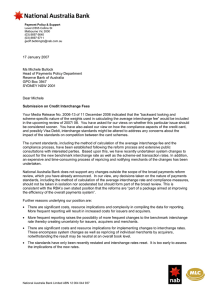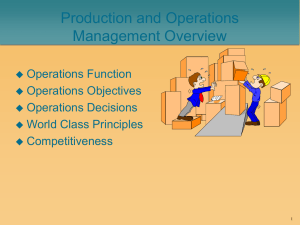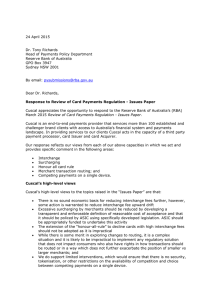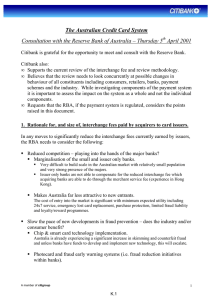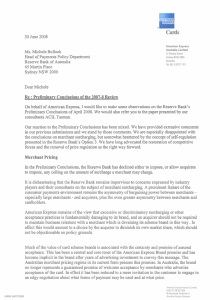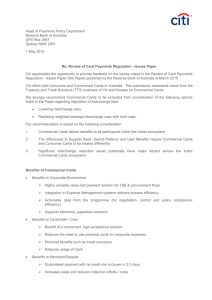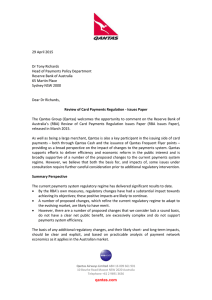24 April 2015 Dr. Tony Richards Head of Payments Policy Department
advertisement
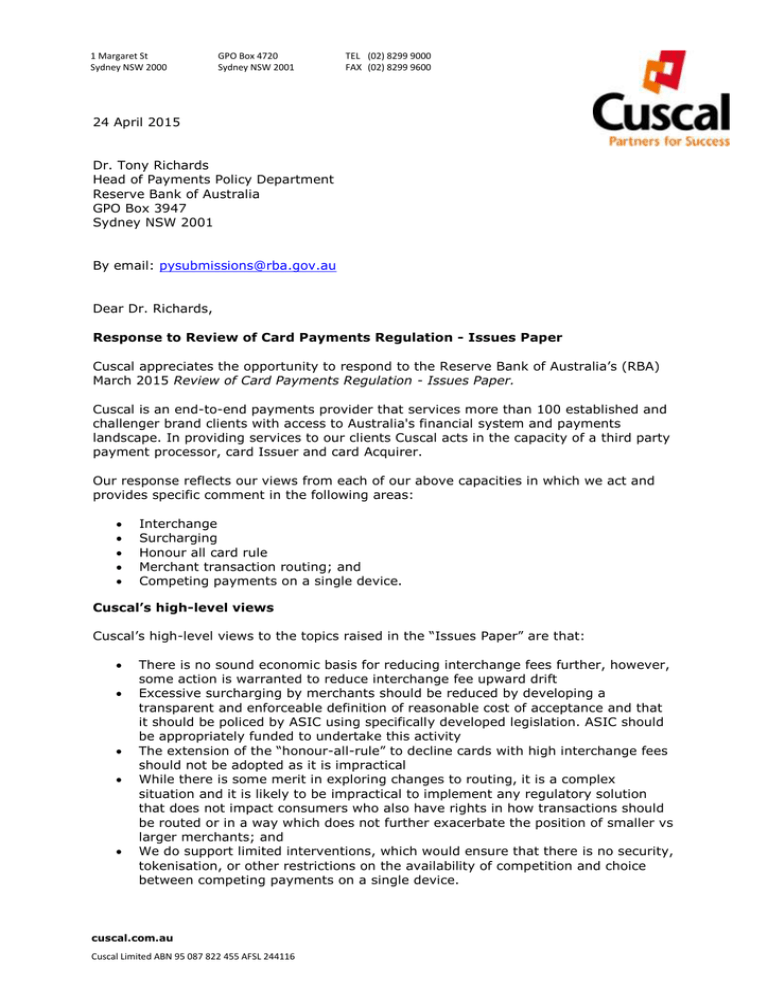
1 Margaret St Sydney NSW 2000 GPO Box 4720 Sydney NSW 2001 TEL (02) 8299 9000 FAX (02) 8299 9600 24 April 2015 Dr. Tony Richards Head of Payments Policy Department Reserve Bank of Australia GPO Box 3947 Sydney NSW 2001 By email: pysubmissions@rba.gov.au Dear Dr. Richards, Response to Review of Card Payments Regulation - Issues Paper Cuscal appreciates the opportunity to respond to the Reserve Bank of Australia’s (RBA) March 2015 Review of Card Payments Regulation - Issues Paper. Cuscal is an end-to-end payments provider that services more than 100 established and challenger brand clients with access to Australia's financial system and payments landscape. In providing services to our clients Cuscal acts in the capacity of a third party payment processor, card Issuer and card Acquirer. Our response reflects our views from each of our above capacities in which we act and provides specific comment in the following areas: Interchange Surcharging Honour all card rule Merchant transaction routing; and Competing payments on a single device. Cuscal’s high-level views Cuscal’s high-level views to the topics raised in the “Issues Paper” are that: There is no sound economic basis for reducing interchange fees further, however, some action is warranted to reduce interchange fee upward drift Excessive surcharging by merchants should be reduced by developing a transparent and enforceable definition of reasonable cost of acceptance and that it should be policed by ASIC using specifically developed legislation. ASIC should be appropriately funded to undertake this activity The extension of the “honour-all-rule” to decline cards with high interchange fees should not be adopted as it is impractical While there is some merit in exploring changes to routing, it is a complex situation and it is likely to be impractical to implement any regulatory solution that does not impact consumers who also have rights in how transactions should be routed or in a way which does not further exacerbate the position of smaller vs larger merchants; and We do support limited interventions, which would ensure that there is no security, tokenisation, or other restrictions on the availability of competition and choice between competing payments on a single device. cuscal.com.au Cuscal Limited ABN 95 087 822 455 AFSL 244116 It is also worth noting that Cuscal’s views are largely in line with those of Australian Payments Clearing Association (APCA) the payments industry peak self-regulatory and lobbying body. However, before providing specific comment on the above areas, we would like to make some more general comments about the reform process to date and the potential lessons we can learn from it in responding to the Review of Card Payments Regulation Issues Paper. General comment about the reform process to date For credit cards between April 2001 and December 2014 there has been over 15 major regulatory decisions1 covering: Designation of card Schemes (2) Interchange fee setting (6) Merchant pricing (2) Access regimes (3); and Surcharging (2). Similarly for debit cards between February 2004 and December 2014 there has been over 17 major regulatory decisions covering: Designation of card Schemes (3) Access regimes (4) Interchange fee setting (7) Surcharging (2); and Honour all cards (1). This is a significant amount of regulatory change with a number of them being made to rectify some unintended consequences particularly for interchange and surcharging. With the current “Issues Paper” the RBA is seeking input on what could potentially lead to up to 15 further regulatory changes covering: Interchange fee setting (8) Surcharging (4) Honour all cards (1) Merchant transaction routing (1) Competing payments on a single device (1) If this were the case this would be an unprecedented level of regulatory change particularly for interchange fee setting and surcharging. As has been seen from the past this level of regulatory intervention could lead to a number of unintended consequences and the need for further regulation to attempt to rectify it. To avoid this risk Cuscal suggests that a more measured approach be taken using only minimal incremental change for interchange and surcharging be adopted and that cost benefit to all stakeholders should be taken into account before regulating. 1 Source: RBA Credit Cards and Debit Cards Regulatory Decisions 2 Specific responses to issues posed by the RBA and/or FSI Report Introduction Cuscal’s response for each of the specific issues for which comment was sought follows. The specific issues that are commented on are shown in italics. Interchange Publishing thresholds for which payment system providers will be subject to interchange or related regulation, possibly based on transaction values and/or market shares. Cuscal supports this approach so as to provide new and existing providers greater regulatory certainty and to create a more transparent level playing field. Broadening interchange fee caps to include other payments between Schemes and issuers. Cuscal does not support the regulation of marketing fees, sign-on fees, incentive fees and rebates as it interferes with and constrains the commercial freedom of payment providers in the market place and could lead to unintended consequences such as reducing competition and innovation. Making changes to the interchange benchmark system to reduce the upward ‘drift’ in average interchange rates inherent in the current three-year reset cycle. Cuscal supports making a minimal change to the system to reduce interchange upward “drift” by recalculating interchange rates on an annual basis. We believe this strikes the optimal balance between minimising complexity, achieving effectiveness and reducing implementation cost. This approach has the added benefit of minimising unintended consequences because of its minimalist level of change. In addition this creates a more level playing field for issuers whose demographics do not support a high level of issuance of “premium cards”. Lowering interchange caps. The FSI report has not made a strong case for reducing interchange below 50 basis points for credit cards or $0.12 for debit cards. All they have done is provide examples of what other jurisdictions have done (primarily the EU) which are not directly applicable to Australia. Comparable countries like Canada have average interchange rates in excess of 150 basis points for credit cards. Furthermore, in their 2007/08 review when considering the move from 50 to 30 basis points, the RBA sought industry commitment to enhanced innovation through the development of ePAL and a new online payments offering in order for interchange rates to remain unchanged. Since then the Australian industry has demonstrated its commitment to enhancing competition and innovation through the development of ePAL and the New Payments Platform. 3 Replacing weighted-average interchange caps with hard caps. Cuscal does not support a hard cap as the weighted average provides flexibility in interchange rates and ensures some level of competitiveness between Schemes. A hard cap could see the maximum become the minimum and certain groups, such as charities, could lose their zero interchange status. However, Cuscal has some sympathy in exploring a potential “Cap” that does not overly disrupt existing arrangements in such a way that has been proposed by APCA. Applying caps as the lesser of a fixed amount and a fixed percentage of transaction values. Cuscal does not support this approach as it is complex and as a result will decrease surcharging transparency. Furthermore its complexity significantly increases implementation and operating costs for Schemes, Issuers and Acquirers. Including prepaid cards within the caps for debit cards. Cuscal supports this on the basis of competitive neutrality. Allowing for ‘buying groups’ for smaller merchants to group together (subject to any competition law restrictions) negotiating for lower interchange rates that are accessible to larger merchants. Cuscal supports this approach being considered. Surcharging A tiered surcharging system, perhaps along the lines of the FSI recommendations. Cuscal does not support this approach as its complexity decreases surcharging transparency for merchants and additionally the same complexity significantly increase implementation and operating costs for Schemes, Issuers and Acquirers. Targeted changes to reduce particular cases of excessive surcharging. Cuscal does not support this as a uniform solution is required for all merchants to ensure competitive neutrality. Any other changes to enforcement procedures and disclosure practices. Cuscal believes that developing a transparent and enforceable definition of reasonable cost of acceptance that is policed by ASIC using specifically developed legislation can reduce excessive surcharging by merchants. Cuscal also believes that there are a number of high profile examples of excessive surcharging beyond the reasonable costs of acceptance that can be observed in the market and that action taken by an appropriate regulator to explore these examples will help improve market practice more generally. 4 Facilitation of differential surcharging by merchants. Cuscal, at an intellectual level has a level of support to explore mechanisms that require Schemes/Acquirers to: Enable merchants to differentially surcharge; and Change Scheme rules to allow merchants to inform customers of their card acceptance costs to justify their surcharging policies. However, we believe that the approach will be impracticable to communicate to customers and that the implementation and operating costs will outweigh the benefits, particularly if these costs are passed on to consumers by Issuers and Acquirers. Honour all cards rule Further easing of ‘honour-all-cards’ rules to allow merchants to decline to accept cards with high interchange fees. Cuscal does not support this approach because it introduces a level of complexity into the interaction with consumers that will be difficult to communicate with consumers particularly in a point-of-sales situation. It is also very likely to increase payment interaction time for the consumer and reduce their level of satisfaction. Furthermore, we struggle to see how this potential change could work in a contactless payment situation using a card. Merchant transaction routing Ensuring that merchants have the ability to choose to route their transactions via lower-cost networks or processors. Cuscal believes there is some merit in exploring this, however, it is a complex situation where the Merchant, Consumer, Issuer and Acquirer could all have different views as to which network they would like to use and may be impractical to implement particularly if one is of the view that the consumer should have primacy of choice. For example, if a consumer wanted to use a Scheme debit card for a transaction that they wished to receive consumer protection for over non-delivery of a service for a travel booking they would be extremely upset if the merchant routed their transaction automatically through the eftpos network where no such consumer protection exists. Further enabling merchants to decide on routing is only likely to benefit a small number of very large merchants who have the capacity to do so and will further widen the gap between the costs borne by small and large merchants. Competing payments on single device Clarifying arrangements for competing payment options within a single device or application. This too is a complex situation where technology is outstripping regulatory oversight. However, at present while eWallets have been developed they are not currently widely deployed in Australia and to date eWallets for the card Schemes allow for the deployment of their credit/debit competitors cards. Cuscal does support the introduction of targeted interventions to ensure that consumer choice does exist and that no payment method is locked out of a new or emerging 5 channel. New standards relating to contactless acceptance and/or tokenization should be developed and overseen by appropriate bodies, such as EMVco, which are scheme agnostic and which effectively balance competition and choice with security considerations. Thank you for the opportunity to comment. Please feel free to contact me if you wish to discuss our submission further. Yours sincerely, ADRIAN LOVNEY General Manager, Product and Service 6
